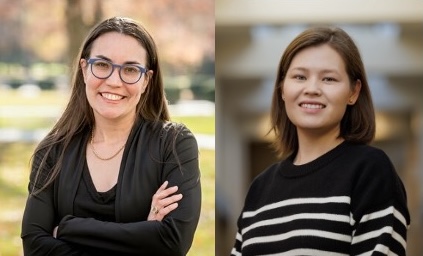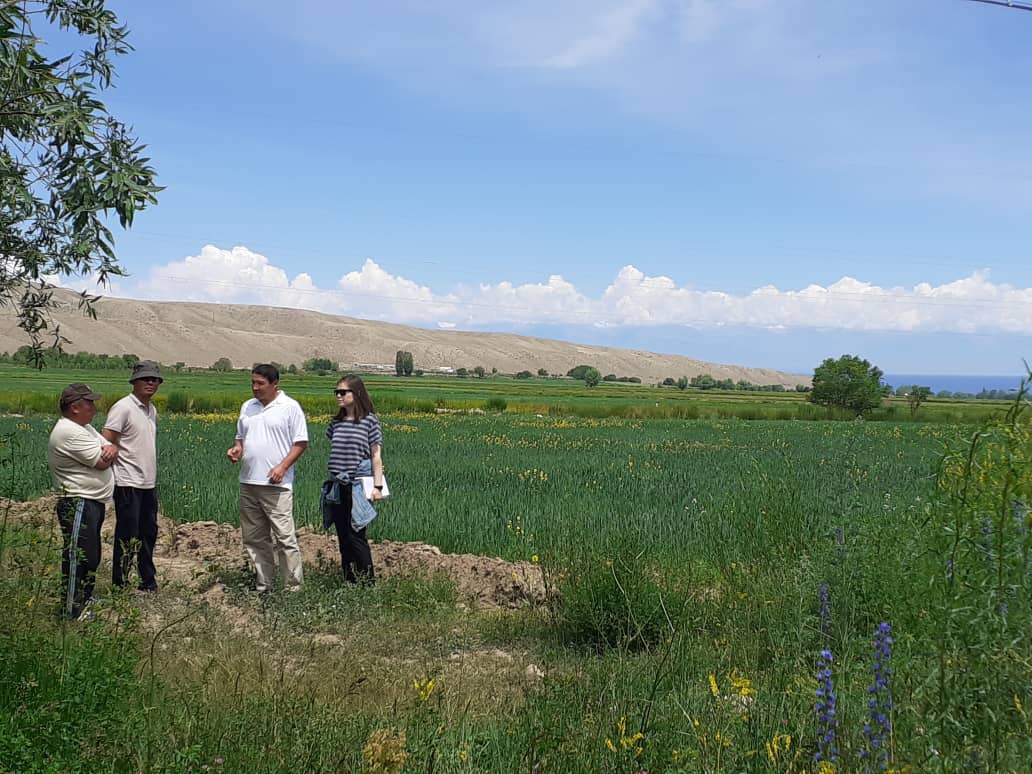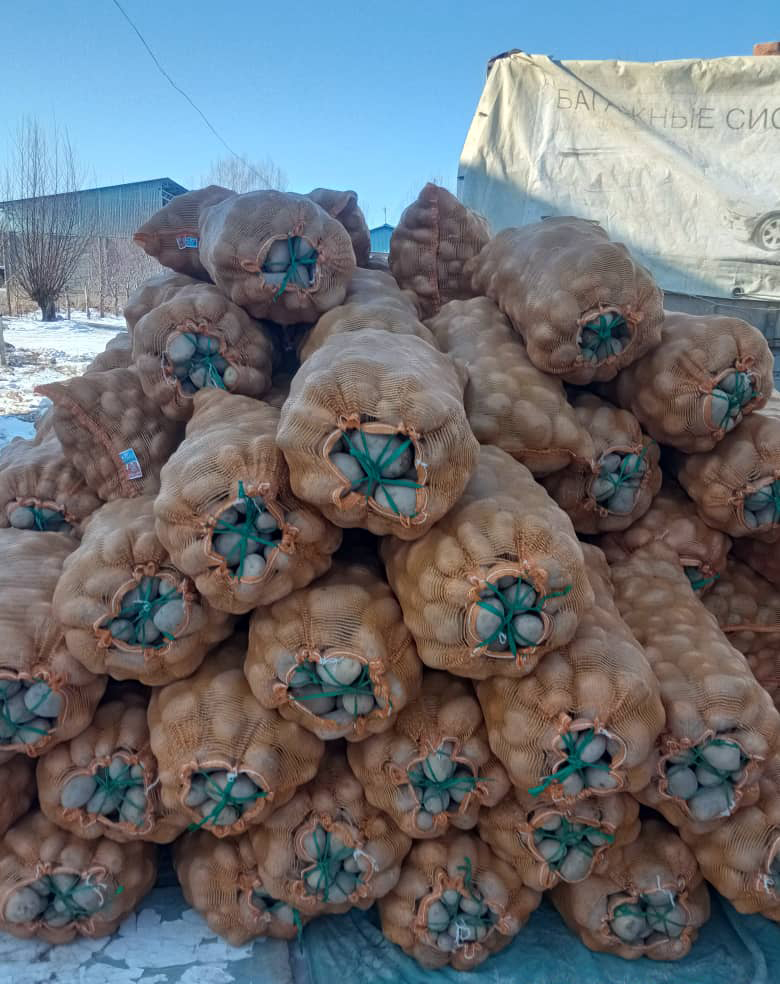 The humble potato is getting some well-deserved attention in a Kellogg-funded research project recently published in the Journal of Development Studies. “Second Bread: Potato Cultivation and Food Security in Kyrgyzstan,” is an open-access paper outlining the results of a two-year project led by Kellogg Faculty Fellow and Associate Professor of Political Science, Susanne Wengle, and coauthored by Saadat Musabaeva, Kellogg research program manager who holds a Master's in Global Affairs from the Keough School, and David Greenwood-Sanchez, assistant professor of political science at The University of Iowa.
The humble potato is getting some well-deserved attention in a Kellogg-funded research project recently published in the Journal of Development Studies. “Second Bread: Potato Cultivation and Food Security in Kyrgyzstan,” is an open-access paper outlining the results of a two-year project led by Kellogg Faculty Fellow and Associate Professor of Political Science, Susanne Wengle, and coauthored by Saadat Musabaeva, Kellogg research program manager who holds a Master's in Global Affairs from the Keough School, and David Greenwood-Sanchez, assistant professor of political science at The University of Iowa.
The paper examines a remarkable boom in potato production over the past thirty years, driven almost entirely by small farms in Kyrgyzstan, a mountainous landlocked country in central Asia.
“There is a high per capita production and high per capita consumption, but it’s very dispersed, so lots of small farmers – kind of a lot of people do this. That’s different from many other places, and it means that it is attractive for farmers, and we wanted to find out why,” says Wengle, contrasting what’s happening in Kyrgyzstan to many parts of the world where large-scale commercial farming is the norm, while also being increasingly criticized for its many shortcomings, in particular its negative impact on the environment.
“It’s often presumed that scaling up and skilling up is just going to be more effective and therefore more profitable,” she says. “We need to know about these models that are different from the dominant food production system that we’re more familiar with.”
For more than a decade, Wengle’s research has centered around the politics of food and agriculture in Russia and the former Soviet Union. She and her coauthors discovered that potatoes are key to national food security in Kyrgyzstan, a central source of income for many Kyrgyz households, and a non-trivial source of export earnings. They termed this system the Kyrgyz Potato Model (KPM).
 “Kyrgyz farmers adopted this model and found it quite useful during various crisis. At the onset of the COVID19 pandemic, potato prices actually went up, and the farmers that we interviewed said that this was a good thing for them. Then Russia’s war with Ukraine started – the second crisis for the region – and people were talking about disruptions to the food system, but the model of small-scale potato production was crisis resilient and remained popular,” says Wengle, noting that the government is relatively absent from this model.
“Kyrgyz farmers adopted this model and found it quite useful during various crisis. At the onset of the COVID19 pandemic, potato prices actually went up, and the farmers that we interviewed said that this was a good thing for them. Then Russia’s war with Ukraine started – the second crisis for the region – and people were talking about disruptions to the food system, but the model of small-scale potato production was crisis resilient and remained popular,” says Wengle, noting that the government is relatively absent from this model.
“Policy consultants and the Kyrgyz government kept talking about how inefficient it was and how it needs to change,” she says. “They have a subsidized credit, but all the farmers we talked to thought it was too bureaucratic and cumbersome to get these credits, so they turned to neighbors if they needed money.”
These strong social networks among Kyrgyz potato farmers are one of the three main factors that drive Kyrgyzstan’s potato economy. The other two are the land reforms that dispersed ownership of land early in the post-Soviet transition, and a match between the potato and the country’s mountainous terrain and continental climate.
In the 1990s, the land reform created small plots for individuals and families who didn’t have the capital to invest in high-tech farming tools and inputs.
“Farmers used old tractors, irrigation systems were quite basic, they had a shared storage basement or stored potatoes in people’s home basements – the infrastructure was basic,” says Wengle, but it works. “They’re sharing information about where to obtain seeds, who is buying, and what prices people are buying at.”
Potatoes are well adapted to the Kyrgyz mountainous, dry climate, similar to the Peruvian Andes where potatoes originated, says Greenwood-Sanchez, who studies the interactions of food and agriculture within the global economy.
“Ninety percent of the country is mountain, and it has an average elevation of 9000 feet. And within that context, it’s also very cool. Within that you have some very natural limitations in terms of what kind of crops you can grow,” says Greenwood-Sanchez. “Within this, what might be considered an aggressive and somewhat hostile environment at times that’s not especially conducive to most traditional agricultural commodities, potato actually thrives and does quite well.”
The KPM leverages the potato nutritional qualities and its cultural status as a food staple across the region.
 “Potato farming provided food security. People ate a lot of potatoes fresh, which is not the case for a lot of commodity crops. Farmers don’t eat their own corn usually,” says Wengle. “This very different from the U.S. for example. In the United States, most of the potatoes produced are turned into potato products.”
“Potato farming provided food security. People ate a lot of potatoes fresh, which is not the case for a lot of commodity crops. Farmers don’t eat their own corn usually,” says Wengle. “This very different from the U.S. for example. In the United States, most of the potatoes produced are turned into potato products.”
According to Musabaeva, who is native to the Issyk-Kul region where this study was conducted, there is a sort of reverence for the potato. Potato cultivation has sustained the people during difficult years.
“This work is particularly important to me because it directly relates to my roots in Kyrgyzstan,” she says. Musabaeva gathered primary data in the field by conducting interviews with farmers and other key stakeholders. She also translated the interviews from Russian or Kyrgyz into English.
“Understanding the dynamics of potato cultivation and its impact on food security resonates deeply with my experiences and the challenges faced by many families in my home country, including my own,” she says. “I remember how my grandparents used to tell me that after the Soviet Union collapsed, people were hungry, they didn’t have food, but they always had potatoes on the table. They told me that potatoes saved so many lives.”
The paper is open access, which means it is free for anyone to read. The research team hopes that “Second Bread” will inspire scholars and activists who work on food systems, and that the KPM will interest policymakers who might otherwise overlook the potato and dismiss small-scale farming as a potential path to food security and export earnings.
“I hope this work will spark greater interest in the region and its unique experiences in potato cultivation, highlighting how the role of small farmers can contribute to food security,” says Musabaeva. “I hope this work will empower local farmers and communities by validating their contributions to national and regional food systems and influence policies that support sustainable development.”
The Kellogg Institute for International Studies, part of the Keough School of Global Affairs at the University of Notre Dame, is an interdisciplinary community of scholars and students from across the University and around the globe that promotes research, provides educational opportunities, and builds partnerships throughout the world on the themes of global democracy and integral human development.





